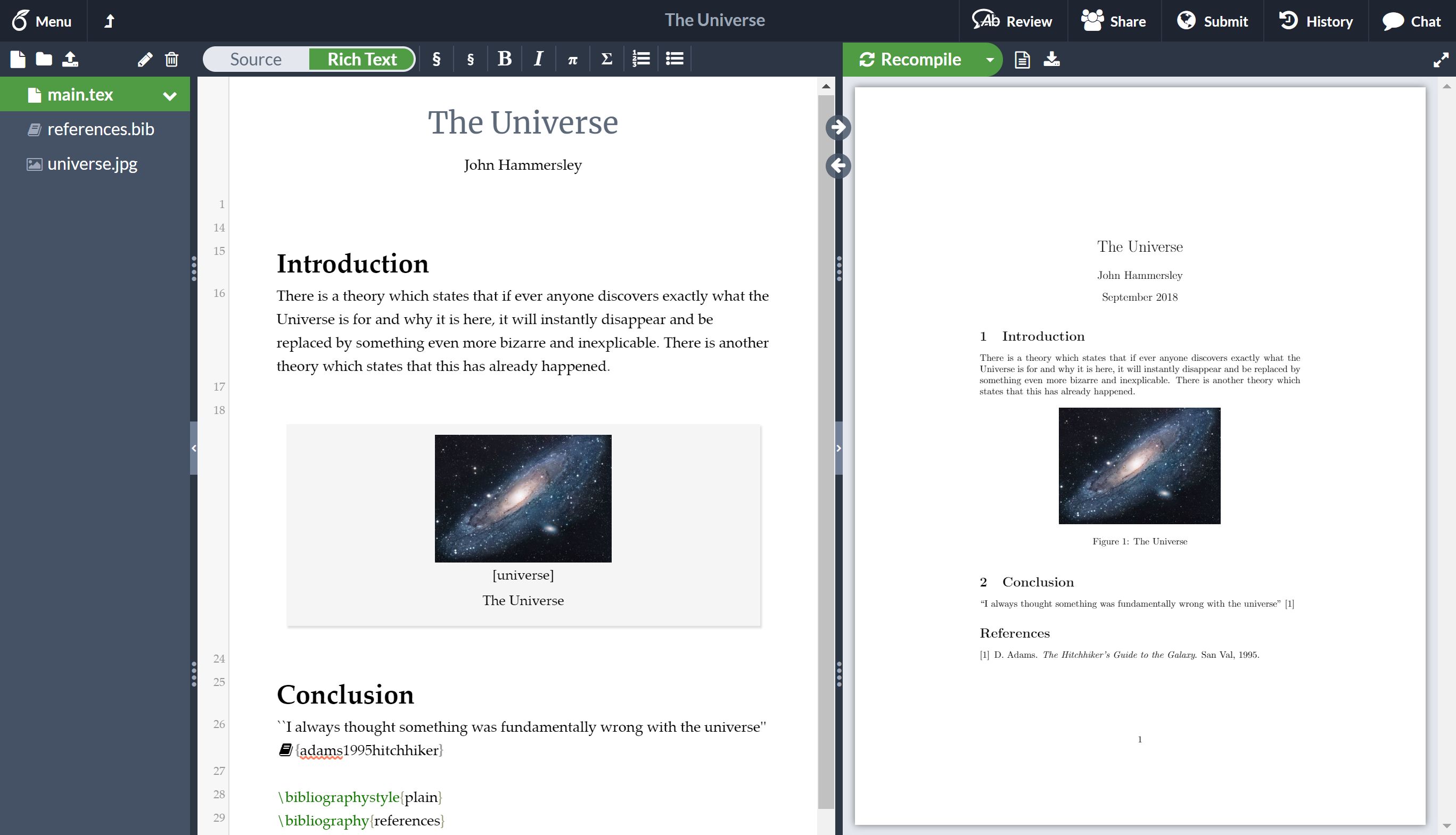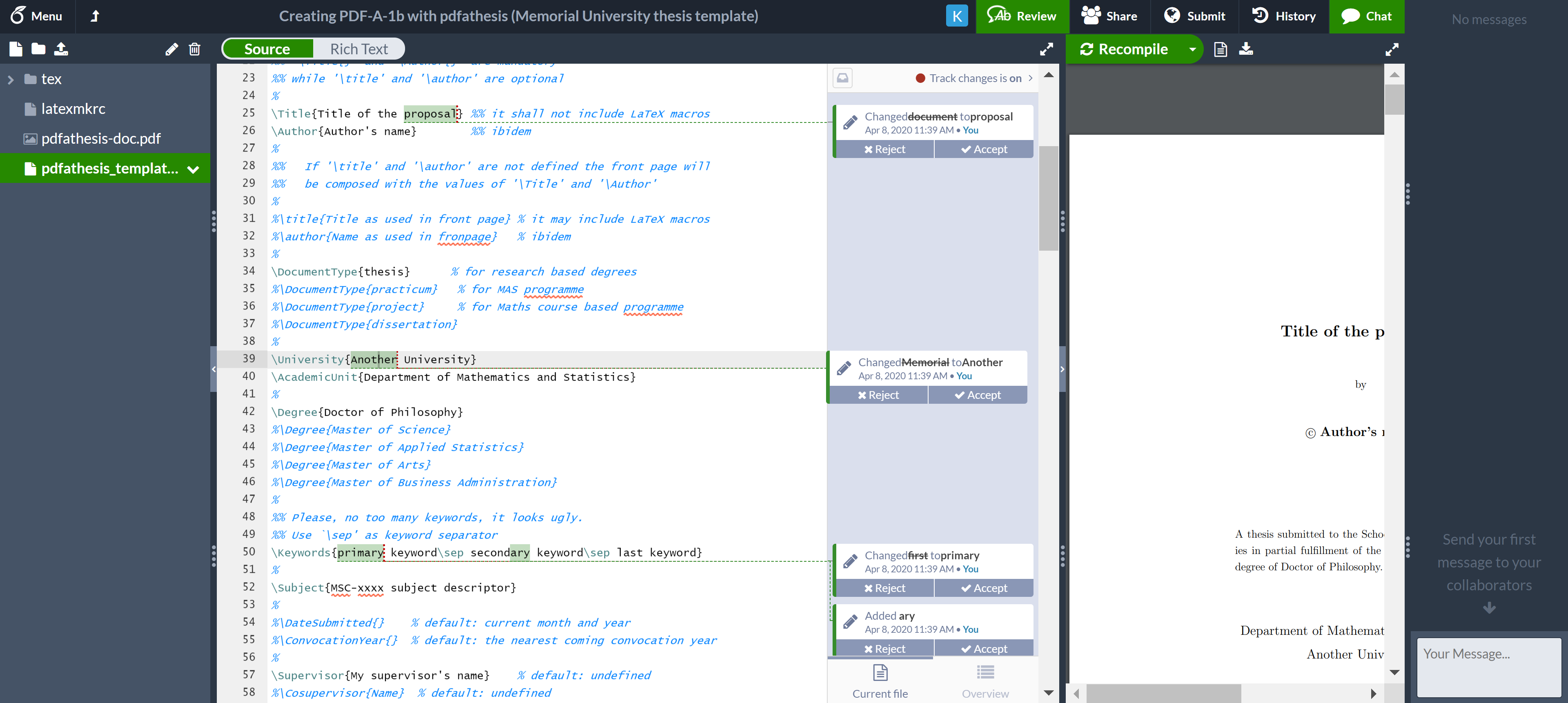Overleaf Helps Vialab with Their Academic Collaboration at Ontario Tech and Beyond
Kate · April 16, 2020The Overleaf authoring platform was chosen by Ontario Tech’s Information Visualization Lab (Vialab) for its wide-ranging functionality, including real-time collaboration and the ability to produce beautifully typeset documents.
- Executive Summary
- Key Use Cases of Overleaf at Ontario Tech
- Benefits of Overleaf for Ontario Tech
- Problem to Solve
- The Overleaf Solution
- Results
Executive Summary
Vialab is a computer science research group at Ontario Tech University. The lab’s research focuses on information visualization, with special attention to text and document analysis.
The lab collaborates with a range of academic researchers both at Ontario Tech and beyond. The collaborative nature of the lab’s work meant they required an authoring tool that could easily provide collaboration for students and faculty for use on campus and in institutions across North America and beyond. They chose Overleaf for this work, as described below.
Key Use Cases of Overleaf at Ontario Tech
- For the creation of influential conference papers across the globe
- For collaborative writing within the lab, more widely across Ontario Tech, and with institutional and industry partners worldwide
- For research proposal documentation, that also gets students into the habit of using LaTeX
- Everyday use for research, writing theses, and writing manuscripts for publications
Benefits of Overleaf for Ontario Tech
- Eliminates the need to work across multiple LaTeX environments
- Eliminates the need to maintain their own LaTeX package repository
- Overleaf’s cloud-based platform allows them to work from anywhere in the world
- Easy for new lab members to pick up and learn
- Real-time collaboration functionality for use internally and with colleagues across the globe
- Allows them to polish papers right up to the deadline
- Over 4000 templates to choose from
Christopher Collins, Associate Professor, and Canada Research Chair in Linguistic Information Visualization said:
Overleaf is indispensable for us. We use it all the time, and we’ve found it makes life so much easier. We use it in our research, thesis writing, project proposals, and manuscripts for publication. When it comes to writing, it’s our main tool.
— Christopher Collins, Associate Professor, and Canada Research Chair in Linguistic Information Visualization

Problem to Solve
Vialab’s previous authoring setup was difficult to manage and use for collaboration.
Members of Vialab previously collaborated on documents and managed their repository using Subversion. They also ran a local installation of LaTeX using the MiKTeX distribution and package manager, and their entire setup ran off an internal server. This required a lot of maintenance, both to make sure the server was backed up, and to ensure that each collaborator had a suitable Integrated Development Environment (IDE) set up as a frontend to the compiler.
Due to the collaborative nature of the lab, they would often work with colleagues internally and with institutions across the globe. Many collaborators were using different LaTeX compilers and environments. This would cause issues when the time came to compile the various documents due to a lack of compatibility between the different LaTeX working environments.
The Overleaf Solution
Vialab wanted something that would eliminate the need to work across multiple LaTeX environments and which could easily deal with packages relevant to the lab’s specialist typesetting requirements. They also required a solution that allowed them to work anywhere—whether in the lab or traveling around the globe at various conferences—and importantly, a solution that new lab students could easily pick up and get working with straight away.
As an easy to use, cloud-based collaborative LaTeX platform, Overleaf is built to help with many of the tasks and needs of Vialab. Everything from an easy to manage and use LaTeX environment, to direct submission to the most relevant journals, to real-time global collaboration.
Overleaf’s intuitive platform is easy to set up and use—users go to the website, open one of the over 4000 templates available, and start to write. There’s nothing to download or install. Users can choose to write in LaTeX or Rich Text mode, which provides a ‘word processor’ type environment for those who are new to LaTeX.
 Overleaf's "Rich Text" mode
Overleaf's "Rich Text" mode
Overleaf runs the TeX Live distribution on its servers, which contains over 3700 packages, and which is kept up to date with new releases. This avoids the need for Vialab or Ontario Tech to maintain their own package repositories - it is all handled by Overleaf.
Christopher Collins, Associate Professor, and Canada Research Chair in Linguistic Information Visualization said:
It’s so easy to get the students up and running. They simply have to get an account, I can share my project with them, and we are up and running. Before this, I’d have had to give them a long tutorial about compiler setup and the package repository. With Overleaf, all that is already taken care of.
— Christopher Collins, Associate Professor, and Canada Research Chair in Linguistic Information Visualization

Before Overleaf, Vialab authors had to each work individually offline and left notes for collaborators using inline comments. They would use comment packages or colored text, and these comments would then appear on the rendered document, potentially altering the layout or flow of the document.
Overleaf eliminates that problem for Vialab as it includes real-time track changes and commenting directly within the platform. Now Vialab collaborators can comment, respond, and resolve in real-time without having comments which interrupt the design of the paper or alter the page numbering and word count.
 Track Changes Function in Overleaf
Track Changes Function in Overleaf
Results
Influential Conference Papers
Vialab members regularly publish papers for conferences across the globe, and these are all written with Overleaf from beginning to end. The ability to find, open and easily write using Overleaf conference templates (such as those for submission to IEEE conferences), as well as the growing number of other conference templates available, is an aspect of Overleaf that Vialab finds extremely useful.
Christopher Collins, Associate Professor, and Canada Research Chair in Linguistic Information Visualization said:
We are writing collaboratively right up until the last minute. We are faced with deadlines all the time, and Overleaf gives us the ability to polish right up until the last possible second. This ability to rapidly iterate on minor changes in the document close to the deadline is incredibly helpful.
— Christopher Collins, Associate Professor, and Canada Research Chair in Linguistic Information Visualization

Members of the Vialab team used Overleaf to create their Saliency Deficit and Motion Outlier Detection in Animated Scatterplots paper, which received an honorable mention at the ACM CHI Conference on Human Factors in Computing Systems, an international conference on Human-Computer Interaction.
External Collaborations
Vialab has used Overleaf in collaborations with Napier University and St. Andrews University in Scotland, amongst others. The lab regularly collaborates with institutions around the US using Overleaf, and also with research centers such as SRI International, an independent nonprofit that helps take the most advanced R&D from the lab to the marketplace.
Research Proposals
Furthermore, the lab also uses Overleaf for internal technical reports and research proposal documentation. It allows the lab to submit nicely formatted reports and proposals, and members of the lab can duplicate the existing template to make a new document easily and quickly. It also gets students into the habit of using Overleaf as soon as they join the lab.
Everyday Use
Vialab at Ontario Tech uses Overleaf every day. The lab uses it to do research and write manuscripts for publications, and the students also use Overleaf for writing their theses.
Christopher Collins, Associate Professor, and Canada Research Chair in Linguistic Information Visualization suggests that Overleaf has also saved him and his lab members time:
I think it saves us significant time. If we want to start a new project from an existing one, all we have to do is duplicate it and share it with our collaborators, and it’s done. Previously I would have had to duplicate the project myself, add it to the repository, and then send an email to everyone with the new link, something that often took upwards of 20 minutes. With Overleaf, I was able to duplicate and share in less than two minutes.
— Christopher Collins, Associate Professor, and Canada Research Chair in Linguistic Information Visualization

Interested in Knowing How Overleaf Can Help Your Institution or Enterprise?
If you would like to know more about how Overleaf solutions can help your Institution or Enterprise, you can read more about the key features and benefits below:
If you have any questions or would like to discuss your options, please contact our sales team to set up a demo.
About Vialab
The Visualization for Information Analysis lab (vialab) is a research group at Ontario Tech University, lead by Dr. Christopher Collins. The lab’s research focuses on information visualization, with special attention on text and document analysis. Other research themes include human-computer interaction more generally, interactive surface and tabletop display interaction and applications research, and computer supported learning. The lab maintains a range of collaborations with other academic researchers both at Ontario Tech and beyond, as well as industrial collaborations.
About Overleaf
Overleaf was founded in 2012 by two mathematicians who built a light-weight collaboration system and used it for writing research papers. It was simple and intuitive to use – all you needed was a web browser. This intuitive online platform has since seen rapid adoption across science and research, and Overleaf's award-winning collaboration technology is now in use by over 5 million researchers, students and technical writers in institutions, labs and industry worldwide.
Part of Digital Science, and working in collaboration with international publishers and organizations, Overleaf is helping to make science and research faster, more open and more transparent by bringing the whole scientific writing process into one connected place in the cloud - from idea, to writing, to review, to publication.
In mid-2017 Overleaf acquired its nearest competitor ShareLaTeX, and our expanded team worked together to build an even stronger next-generation platform.